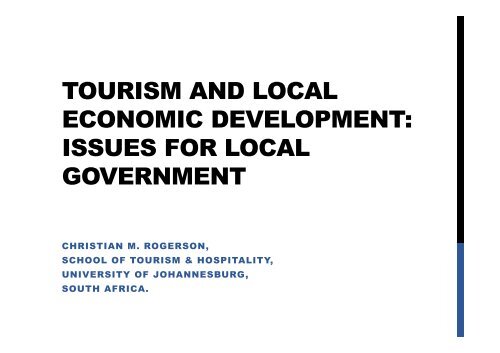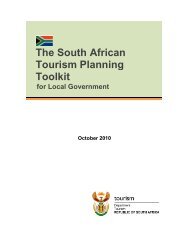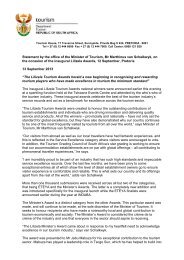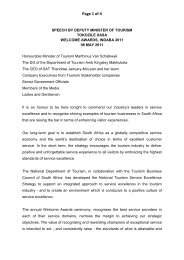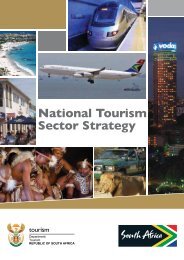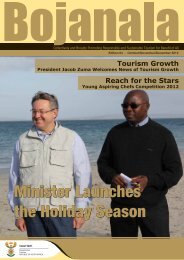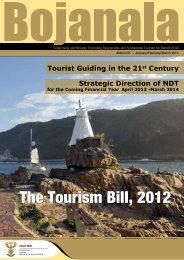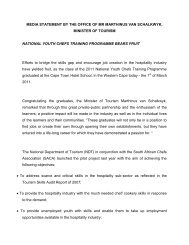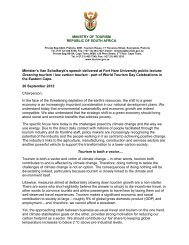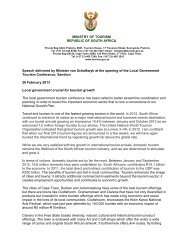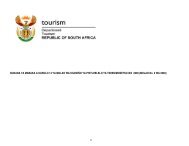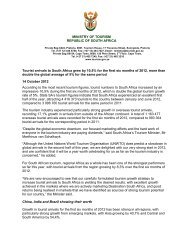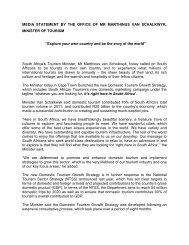TOURISM & LOCAL ECONOMIC DEVELOPMENT PROF ROGERSON
TOURISM & LOCAL ECONOMIC DEVELOPMENT PROF ROGERSON
TOURISM & LOCAL ECONOMIC DEVELOPMENT PROF ROGERSON
You also want an ePaper? Increase the reach of your titles
YUMPU automatically turns print PDFs into web optimized ePapers that Google loves.
<strong>TOURISM</strong> AND <strong>LOCAL</strong><br />
<strong>ECONOMIC</strong> <strong>DEVELOPMENT</strong>:<br />
ISSUES FOR <strong>LOCAL</strong><br />
GOVERNMENT<br />
CHRISTIAN M. <strong>ROGERSON</strong>,<br />
SCHOOL OF <strong>TOURISM</strong> & HOSPITALITY,<br />
UNIVERSITY OF JOHANNESBURG,<br />
SOUTH AFRICA.
INTRODUCTION<br />
• Local economic development is one of the core functions<br />
of local government in South Africa<br />
• Support for local development comes from a range of<br />
government departments, including dti, DCOG, and NDT.<br />
• Traditionally LED in South Africa has been focussed around<br />
increasing PRODUCTION in localities… ie expansion of<br />
production of industry, agriculture, mining etc.<br />
• One alternative driver for local economic development is<br />
tourism
INTRODUCTION (2)<br />
• Tourism planning is about creating localities as centres for<br />
CONSUMPTION<br />
• This presentation seeks to highlight issues for local<br />
government in planning tourism as a lead sector or driver<br />
for LED in South Africa.
KEY ARGUMENTS<br />
• Successful tourism spaces emerge out of various<br />
circumstances<br />
• Successful tourism-led development requires certain preconditions<br />
in terms of having certain assets for tourism<br />
development.<br />
• From international experience of successful tourism-led<br />
development ten principles can be identified for South<br />
African local governments to inform planning for tourism.
SUCCESSFUL<br />
<strong>TOURISM</strong> <strong>LOCAL</strong>ITIES<br />
* Localities can emerge as successful tourism spaces for<br />
essentially three reasons<br />
• First, many localities, such as beach resorts or spas, are<br />
‘discovered’ by private sector entrepreneurs or developers<br />
who identify in these places, certain opportunities for<br />
development, triggering the growth of accommodation<br />
and recreational facilities, tourist attractions or conference<br />
centres.<br />
• Second, other localities become tourism spaces as a<br />
result of local initiatives which sometimes are driven out<br />
of necessity for new economic opportunities.
SUCCESSFUL<br />
<strong>TOURISM</strong> <strong>LOCAL</strong>ITIES<br />
* Examples would be the growth of urban tourism or tourism<br />
routes<br />
• Finally, other localities emerge as tourism spaces by<br />
default as particularly in developed countries certain<br />
localities have become tourism spaces, if not against the<br />
will of the local inhabitants then at least often without their<br />
direct encouragement, as a result of much enhanced<br />
levels of personal mobility.<br />
• For example, many coastal and rural areas, mountain and<br />
wilderness spaces, have become tourism spaces by<br />
default often because of improved levels of mobility and of<br />
an increased search by people for new experiences in<br />
places previously untouched by tourism
PRECONDITIONS FOR<br />
SUCCESS<br />
* For a locality to be successful in terms of tourism as a driver for<br />
development, certain preconditions need to be met.<br />
* Tourism asset base - there is a fundamental requirement for localities to<br />
develop a total tourism product or portfolio of products which will attract<br />
visitors.<br />
* The competitive position of any tourism destination is determined to a<br />
significant extent by the diversity and quality of its resources and services.<br />
In particular, considerable emphasis is given to the importance of QUALITY<br />
OF ASSETS as a factor in impacting upon the competitiveness of tourism<br />
spaces.<br />
*Assets can be natural beauty (mountain, beach), heritage resources, unique<br />
wildlife etc and socio-cultural resources (including festivals, sports events).<br />
*Overall, the attractiveness of particular tourism spaces arises from its blend<br />
of resources and services. Davidson and Maitland (1997, p. 23) observe:<br />
“Without such a mix, a place will not work as a destination”.
PRECONDITIONS FOR<br />
SUCCESS<br />
• A second critical precondition for success is appropriate<br />
and effective planning and management of tourism at<br />
destinations.<br />
• The need for visitor management planning arises from the<br />
fact that whilst the private sector driven tourism industry<br />
may be successful at attracting visitors to destinations, it<br />
is often less successful at protecting destinations from<br />
the negative effects of tourism development. The visitor<br />
management planning process is concerned with how to<br />
accommodate visitors whilst minimizing the adverse<br />
impacts that they may cause.<br />
• International experience points to the need for local<br />
partnerships between local authority and private sector<br />
and development of local tourism plans.
TEN KEY PRINCIPLES FOR<br />
SUCCESSFUL <strong>TOURISM</strong>-LED<br />
<strong>LOCAL</strong> <strong>ECONOMIC</strong><br />
<strong>DEVELOPMENT</strong><br />
• From the existing international experience in both<br />
developed and developing countries a series of key<br />
lessons can be extracted that can be useful for South<br />
African policy makers<br />
• 10 key principles are presented here for achieving<br />
successful tourism-led local economic development.<br />
• These can be viewed as ‘good practice’ for local<br />
government and tourism planning
PRINCIPLES FOR SUCCESS<br />
THEME 1: BE REALISTIC<br />
*There is a need for realism by policy-makers as to whether tourism<br />
is a viable option for particular localities, whether in urban or rural<br />
areas.<br />
• Unless the locality has an adequate total tourism product or<br />
portfolio of products, tourism-led LED is not a viable option.<br />
• Areas that would not have the basic requirements for tourism<br />
would be those which are in combination (a) intrinsically<br />
physically unattractive, (b) lack infrastructure, (c) not perceived<br />
as safe or secure; and/or (d) inaccessible by road or rail (and<br />
increasingly air).
PRINCIPLES FOR SUCCESS<br />
THEME 2: DO NOT DIVORCE <strong>ECONOMIC</strong> <strong>DEVELOPMENT</strong> FROM<br />
SOCIAL <strong>DEVELOPMENT</strong> AND THE ENVIRONMENT<br />
* Economic development cannot be divorced from environmental,<br />
and particularly social development.<br />
• As well as job creation, enterprise development and<br />
environmental management, there is a need for stable<br />
communities, a well trained and educated workforce, safe<br />
environments and a healthy population.<br />
• Tourism cannot create these social benefits but it cannot survive<br />
long without them – initiatives by local government are crucial.
PRINCIPLES FOR<br />
SUCCESS<br />
THEME 3: LINK <strong>TOURISM</strong> <strong>DEVELOPMENT</strong> TO PRO-POOR<br />
INITIATIVES<br />
* Successful LED means bringing tangible benefits to poor<br />
communities.<br />
• In developing economies, therefore, LED must be firmly<br />
linked to a commitment to pro-poor tourism policies.<br />
• Pro-poor interventions in LED strategies must seek to<br />
enhance opportunities and expand the impact of tourism<br />
widely in local communities.<br />
• In addition, tourism taxes or spin-offs might be used to<br />
improve local schools, health facilities or community<br />
development projects.
PRINCIPLES FOR<br />
SUCCESS<br />
THEME 4: DO NOT PLAN <strong>TOURISM</strong> IN ISOLATION – CREATE<br />
SYNERGIES WITH OTHER SECTORS<br />
• It must be acknowledged that tourism does not exist in<br />
isolation of other economic activities.<br />
• In planning a holistic approach is required in LED<br />
programming which recognises the linkages between<br />
tourism and other economic activities, seeks synergies<br />
and complementarities.<br />
• Linking tourism and local agriculture to support local<br />
sourcing
PRINCIPLES FOR<br />
SUCCESS<br />
THEME 5: PLANNING SHOULD TRY AND AVOID TOURIST<br />
ENCLAVES OR GHETTOS<br />
• Attempts in local planning should be made to avoid the<br />
ghettoisation of tourism in destination regions.<br />
• Tourists should be encouraged to venture away from the<br />
‘tourist oases’ and instead participate in a richer learning<br />
experience in destination areas.<br />
• Encourage tourists to meet local people, take part in<br />
everyday local events or even to visit local work places.<br />
• Encourage a geographic spread of tourism within<br />
destinations
PRINCIPLES FOR<br />
SUCCESS<br />
THEME 6: PLAN OPPORTUNITIES FOR <strong>TOURISM</strong><br />
<strong>DEVELOPMENT</strong>S LED BY SMALL BUSINESSES AS WELL<br />
AS LARGE ENTERPRISES<br />
* Large tourism investors must be welcomed<br />
• But there is a strong case for seeking to move away from<br />
large-scale and prestige projects and instead focus upon<br />
smaller scale projects, which growing organically over<br />
time and under local managerial control, where possible.<br />
• Smaller tourism projects potentially might offer greater<br />
opportunities for local enterprise and especially for SMME<br />
development.
PRINCIPLES FOR<br />
SUCCESS<br />
THEME 7: DO NOT JUST PLAN FOR GROWTH IN VISITOR<br />
NUMBERS – INSTEAD PLAN TO MAXIMISE <strong>LOCAL</strong><br />
IMPACTS<br />
• Local networks and networking should be encouraged as<br />
far as possible in order to ensure that the requirements of<br />
the tourism industry are maximised for local suppliers,<br />
reducing leakages from the local economy.<br />
• Build and support local supply chains to tourism<br />
establishments especially accommodation establishments
PRINCIPLES FOR<br />
SUCCESS<br />
THEME 8: ESTABLISH RESEARCH AND MONITORING<br />
SYSTEMS<br />
• For successful tourism development local governments<br />
must establish data systems and monitoring of<br />
performance of local tourism economies.<br />
• Constant and objective monitoring and performance<br />
indicators need to be put in place.
PRINCIPLES FOR<br />
SUCCESS<br />
THEME 9: COMMUNITY PARTICIPATION IS IMPORTANT BUT<br />
BE REALISTIC<br />
• Community participation within and support for a tourismled<br />
local economic development initiative must be<br />
maximised.<br />
• Nevertheless, in developing countries, the limits of<br />
community participation also need to be recognised.<br />
• It is naïve to assume that a participatory tourism<br />
development approach will alter the existing structure of<br />
the tourism industry without changing the dominant<br />
socio-economic and political structure of a locality.
PRINCIPLES FOR<br />
SUCCESS<br />
THEME 10: GOOD GOVERNANCE<br />
• Tourism-led development cannot succeed in an<br />
environment of inefficient local government, corruption,<br />
over-regulation etc.<br />
• There is a critical need for good governance, cooperation<br />
and institutional thickness in order for the effective<br />
implementation of tourism-led LED.
CONCLUSION<br />
• The challenge of developmental local government and the<br />
promotion of LED is one that must be mainstreamed in the<br />
activities of South African local government.<br />
• The international record shows that tourism can be a<br />
critical driver for local economic development for some<br />
(but not all) localities.<br />
• In terms of achieving successful tourism-led local<br />
development 10 principles for success and lessons for<br />
local government have been identified
CONCLUSION (2)<br />
• Realism is needed as to viability of tourism to be a lead<br />
sector.<br />
• Plan tourism-led economic development together with<br />
achieving social development and environmental<br />
management.<br />
• Maximise pro-poor impacts through searching for propoor<br />
tourism opportunities<br />
• Do not plan tourism in isolation – create synergies with<br />
other economic activities.<br />
• Try to avoid tourism enclaves in destinations by<br />
encouraging local geographical spread of tourists<br />
wherever possible.
CONCLUSION (3)<br />
• Large investments are welcome but keep the welcome mat<br />
in place for tourism development led by small enterprises.<br />
• Maximise local supply chains to key tourism products<br />
• Establish local research and monitoring systems<br />
• Maximise within its limits the opportunities for community<br />
participation.<br />
• Local governments must take responsibility for good<br />
governance in order to achieve and maximise possibilities<br />
for tourism-led local economic development.


